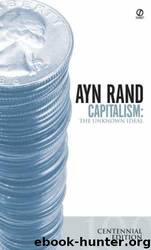Capitalism: the unknown ideal by Ayn Rand

Author:Ayn Rand
Language: eng
Format: mobi, epub
Tags: Economics, Philosophy, History & Theory, General, United States, Political Science, Capitalism, Free Enterprise, Business & Economics
ISBN: 9780451147950
Publisher: New American Library
Published: 1966-08-15T08:00:00+00:00
18. THE OBLITERATION OF CAPITALISM
by Ayn Rand
In my article “ ‘Extremism,’ or The Art of Smearing,” I discussed the subject of “anti-concepts”—i.e., artificial, unnecessary, undefined and (rationally) unusable terms intended to replace and obliterate certain legitimate concepts in people’s minds.
I said that the “liberals” are coining and spreading “anti-concepts” in order to smuggle this country into statism by an imperceptible process—and that the primary target marked for obliteration is the concept of “capitalism,” which, if lost, would carry away with it the knowledge that a free society can and did exist.
But there is something much less attractive (and, politically, much more disastrous) than capitalism’s enemies: its alleged defenders—some of whom are muscling in on the game of manufacturing “anti-concepts” of their own.
Have you ever felt a peculiar kind of embarrassment when witnessing a grossly inappropriate human performance, such as the antics of an unfunny comedian? It is a depersonalized, almost metaphysical embarrassment at having to witness so undignified a behavior on the part of a member of the human species.
The Objectivist Newsletter, October 1965.
That is what I feel at having to hear the following statement of Governor Romney, which was his alleged answer to the communists’ boast that they would bury capitalism:
“But what they do not understand—and what we have failed to tell the world—is that Americans buried capitalism long ago, and moved on to consumerism.”
The implications of such a statement are too sickeningly obvious. The best comment on it came from The Richardson Digest (Richardson, Texas, April 28, 1965), from the column “Lively Comments” by Earl Lively, who wrote: “Afraid to stand alone, even on his knees, Romney then tells the rest of us that we do not know the definition of capitalism, we do not understand our economic principles, and we’d be better off if we quit going around defending such an unpopular concept as capitalism.”
Mr. Lively is admirably precise in his description of the posture involved. But Mr. Romney is not alone in it. A number of intellectually more reputable men (including some distinguished free-enterprise economists) have adopted the same stance and the same line for the same psychological reasons.
There are the economists who proclaim that the essence (and the moral justification) of capitalism is “service to others—to the consumers,” that the consumers’ wishes are the absolute edicts ruling the free market, etc. (This is an example of what a definition by non-essentials accomplishes, and of why a half-truth is worse than a lie: what all such theorists fail to mention is the fact that capitalism grants economic recognition to only one kind of consumer: the producer—that only traders, i.e., producers who have something to offer, are recognized on a free market, not “consumers” as such—that, in a capitalist economy, as in reason, in justice, and in reality, production is the pre-condition of consumption.)
There are the businessmen who spend fortunes on ideological ads, allegedly in defense of capitalism, which assure the public that all but a tiny fraction of an industry’s income goes to labor (wages), to government (taxes), etc.
Download
This site does not store any files on its server. We only index and link to content provided by other sites. Please contact the content providers to delete copyright contents if any and email us, we'll remove relevant links or contents immediately.
The Secret History by Donna Tartt(19092)
The Social Justice Warrior Handbook by Lisa De Pasquale(12191)
Thirteen Reasons Why by Jay Asher(8912)
This Is How You Lose Her by Junot Diaz(6889)
Weapons of Math Destruction by Cathy O'Neil(6281)
Zero to One by Peter Thiel(5802)
Beartown by Fredrik Backman(5759)
The Myth of the Strong Leader by Archie Brown(5509)
The Fire Next Time by James Baldwin(5448)
How Democracies Die by Steven Levitsky & Daniel Ziblatt(5219)
Promise Me, Dad by Joe Biden(5154)
Stone's Rules by Roger Stone(5088)
A Higher Loyalty: Truth, Lies, and Leadership by James Comey(4964)
100 Deadly Skills by Clint Emerson(4927)
Rise and Kill First by Ronen Bergman(4790)
Secrecy World by Jake Bernstein(4753)
The David Icke Guide to the Global Conspiracy (and how to end it) by David Icke(4720)
The Farm by Tom Rob Smith(4514)
The Doomsday Machine by Daniel Ellsberg(4490)
